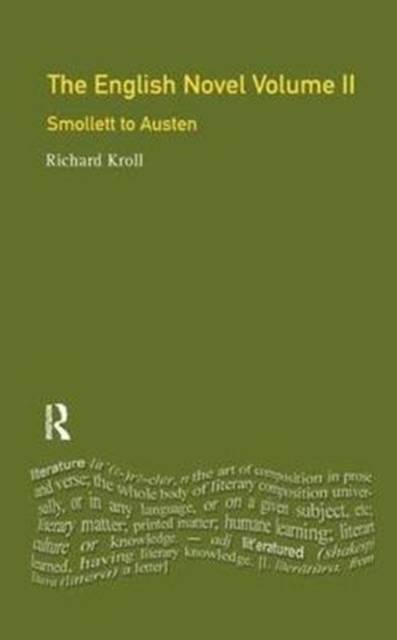
- Afhalen na 1 uur in een winkel met voorraad
- Gratis thuislevering in België vanaf € 30
- Ruim aanbod met 7 miljoen producten
- Afhalen na 1 uur in een winkel met voorraad
- Gratis thuislevering in België vanaf € 30
- Ruim aanbod met 7 miljoen producten
Zoeken
Omschrijving
The English Novel, Volume II: Smollett to Austen collects a series of previously-published essays on the early eighteenth-century novel in a single volume, reflecting the proliferation of theoretical approaches since the 1970s. The novel has been the object of some of the most exciting and important critical speculations, and the eighteenth-century novel has been at the centre of new approaches both to the novel and to the period between 1750 and 1800. Richard Kroll's introduction seeks to frame the contributions by reference to the most significant critical discussions. These include: the general importance of 'sentimentalism' as a cultural movement after 1750; its relationship to the emergence of the Gothic novel as a specific genre or mode; the rapid rise in the number of women novelists in the later eighteenth century; the relationship between the novel as mediator of social relations and the idea of the 'public sphere'; the relationship between novelistic codes and the massive growth of a consumerist society; the class conflicts of writers like Smollett; the effect on the novel of the new 'British' nation; and the effects of the French Revolution and the subsequent political debates on writers like Wollstonecraft, Godwin, and Austen.This collection will be of interest to students of the later enlightenment, and also to all who are interested in late eighteenth-century radicalism, and the general relationship between literature, history, and politics.
Specificaties
Betrokkenen
- Auteur(s):
- Uitgeverij:
Inhoud
- Aantal bladzijden:
- 330
- Taal:
- Engels
- Reeks:
Eigenschappen
- Productcode (EAN):
- 9781138439962
- Verschijningsdatum:
- 20/07/2017
- Uitvoering:
- Hardcover
- Formaat:
- Genaaid
- Afmetingen:
- 138 mm x 216 mm
- Gewicht:
- 452 g

Alleen bij Standaard Boekhandel
+ 527 punten op je klantenkaart van Standaard Boekhandel
Beoordelingen
We publiceren alleen reviews die voldoen aan de voorwaarden voor reviews. Bekijk onze voorwaarden voor reviews.











